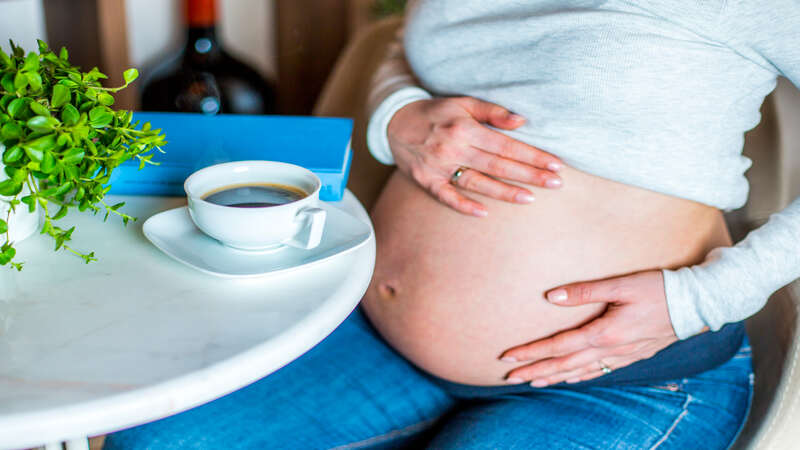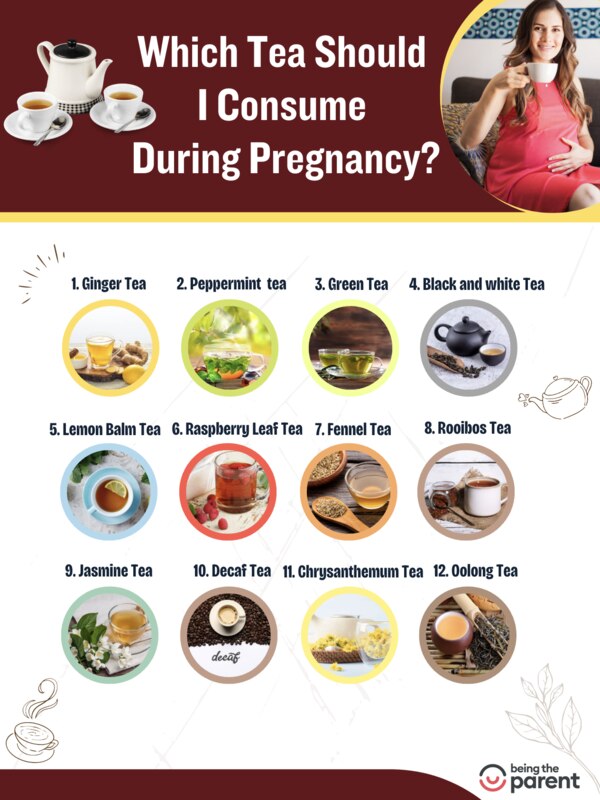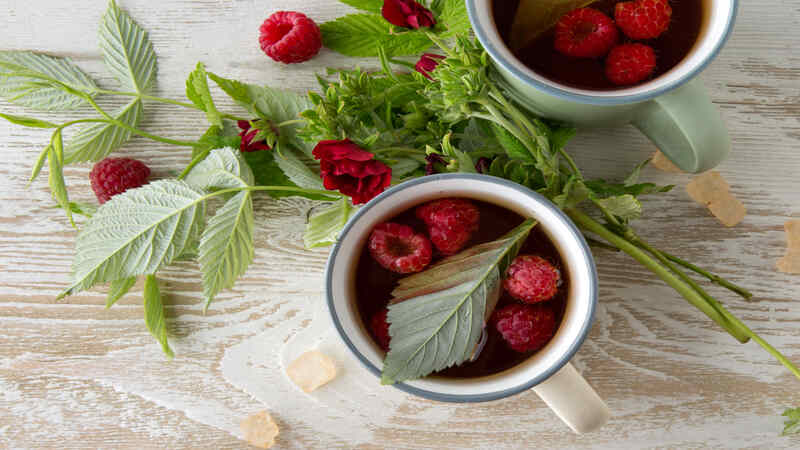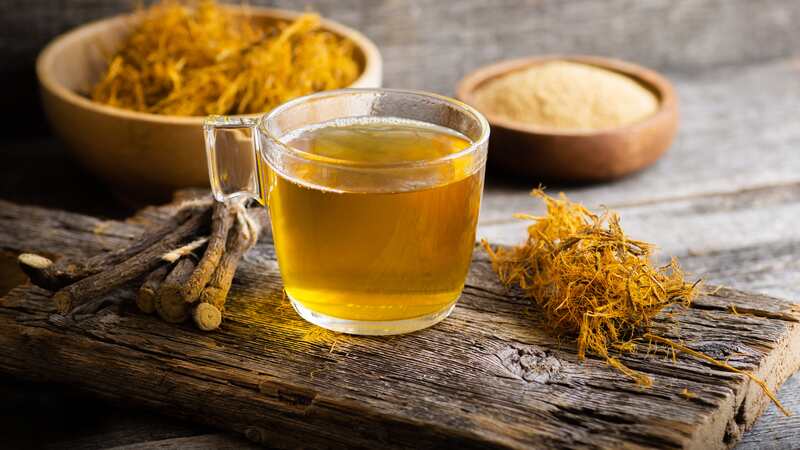 Tea is a popular beverage, globally enjoyed by most women during pregnancy as a relaxing drink while meeting fluid needs. However, some women use tea as a natural remedy for pregnancy-related symptoms or to prepare for childbirth, believing it is safe due to its natural properties. Real concern comes regarding the intake and safety of tea during pregnancy
Tea is a popular beverage, globally enjoyed by most women during pregnancy as a relaxing drink while meeting fluid needs. However, some women use tea as a natural remedy for pregnancy-related symptoms or to prepare for childbirth, believing it is safe due to its natural properties. Real concern comes regarding the intake and safety of tea during pregnancy
During pregnancy, women should reduce or avoid their intake of certain teas due to potential contamination with lead from old tea leaves. Pregnant women must choose tea brands with low levels of lead. This article provides insights into the safety of drinking tea during pregnancy, outlining which teas are safe for consumption and which to avoid.
Video – Tea During Pregnancy – Safe Choices and Risks
Can I Drink Tea While Pregnant?
Consuming tea during pregnancy can be considered safe if specific precautions are taken into account (1). It is crucial to carefully monitor the amount of caffeine present in black, green, and white teas, as excessive consumption can pose risks. The American College of Obstetricians and Gynecologists (ACOG) advises expectant mothers to limit their caffeine intake to less than 200 milligrams per day (2). While herbal teas are often perceived as beneficial, they may not always be suitable during pregnancy. Before consuming any type of tea, it is important to assess its caffeine content and consult with your healthcare professional regarding this.
13 Types of Tea that are Safe To Drink During Pregnancy
 When considering tea consumption during pregnancy, certain teas are deemed safe for pregnant women. Let’s understand more:
When considering tea consumption during pregnancy, certain teas are deemed safe for pregnant women. Let’s understand more:
1. Ginger Tea
Ginger during pregnancy alleviates morning sickness during pregnancy, and research has demonstrated its safety and effectiveness (3). However, there is also some evidence suggesting that it may affect fetal sex hormones and increase the risk of vaginal bleeding during pregnancy when taken in excess. Therefore, it is vital to understand the benefits and risks of consuming ginger tea with your healthcare provider before doing so.
2. Peppermint tea
Peppermint Tea is another safe choice for soothing an upset stomach during pregnancy. However, it is to be noted that it may not be effective in alleviating morning sickness. Moreover, peppermint tea is associated with heartburn, a common symptom during pregnancy (4).
3. Green Tea
 Green tea, including popular matcha varieties, is considered safe for consumption during pregnancy (5). There are 8 benefits of consuming green tea during pregnancy. It contains significantly less caffeine than coffee, with about 25 grams per cup compared to 100 grams. Limit green tea intake to less than three cups per day. Green tea is rich in catechins that hinder the absorption of folic acid (6). Adequate folic acid intake is crucial during pregnancy to help prevent neural tube defects (7).
Green tea, including popular matcha varieties, is considered safe for consumption during pregnancy (5). There are 8 benefits of consuming green tea during pregnancy. It contains significantly less caffeine than coffee, with about 25 grams per cup compared to 100 grams. Limit green tea intake to less than three cups per day. Green tea is rich in catechins that hinder the absorption of folic acid (6). Adequate folic acid intake is crucial during pregnancy to help prevent neural tube defects (7).
4. Black and white Tea
Quite similar to green tea, they are generally regarded as safe for consumption during pregnancy (8). It is essential to moderate your intake, as consuming four cups of black tea during pregnancy, for example, will exceed the recommended daily caffeine limit of 200 mg. Remember that iced tea is prepared using black tea, so be mindful of its caffeine content.
5. Lemon Balm Tea
Lemon balm tea is considered safe to consume during pregnancy and is valued for its calming properties. Expectant mothers often find it helpful for reducing anxiety, improving sleep, enjoying its refreshing flavor during taste changes, and relieving gastrointestinal issues (9).
6. Raspberry Leaf Tea
 It is the most frequently used tea known for its potential advantages during pregnancy by improving uterine health via increasing blood flow and strengthening uterine muscle fibers, a possible reduction in the duration of labor (10).
It is the most frequently used tea known for its potential advantages during pregnancy by improving uterine health via increasing blood flow and strengthening uterine muscle fibers, a possible reduction in the duration of labor (10).
7. Fennel Tea
Fennel tea, made from fennel seeds or saunf, is generally considered safe for consumption during pregnancy. The anethole compounds found in fennel seeds have been shown to improve hormonal balance and alleviate morning sickness during pregnancy (11). Additionally, research has confirmed that the anti-flatulence properties of saunf help relax the muscles of the digestive system, stimulate bile flow, and reduce symptoms such as bloating, heartburn, and indigestion in pregnant women (12).
8. Rooibos Tea
 Rooibos tea offers numerous health benefits for pregnant women, including anxiety and stress reduction, relief from morning sickness, improved hydration, strengthened uterus for delivery, and enhanced skin health (13). Due to its abundant antioxidants, ability to enhance nutrient absorption and positive impact on adrenal gland health, rooibos tea comes highly recommended (14). Depending on the pregnancy stage, it is appropriate to consume 1 to 3 cups daily, with research indicating that initiating 2 to 3 cups daily at 32 weeks gestation is optimal while limiting consumption to 1 cup daily during earlier pregnancy stages (15).
Rooibos tea offers numerous health benefits for pregnant women, including anxiety and stress reduction, relief from morning sickness, improved hydration, strengthened uterus for delivery, and enhanced skin health (13). Due to its abundant antioxidants, ability to enhance nutrient absorption and positive impact on adrenal gland health, rooibos tea comes highly recommended (14). Depending on the pregnancy stage, it is appropriate to consume 1 to 3 cups daily, with research indicating that initiating 2 to 3 cups daily at 32 weeks gestation is optimal while limiting consumption to 1 cup daily during earlier pregnancy stages (15).
9. Jasmine Tea
Jasmine tea is rich in antibacterial properties and provides a wonderful low-caffeine alternative for expectant mothers, offering calming effects and antibacterial properties that address oral health concerns. Its fluoride content helps fortify tooth enamel and guard against decay, establishing it as a valuable component of a pregnancy self-care regimen (16).
10. Decaf Tea
 Consuming decaf tea offers more potential than regular black or green tea, with each cup providing around 2 mg of caffeine, which is incredibly advantageous for safeguarding the health of both the expecting mother and fetus. It’s important to gradually transition to this tea, as sudden caffeine withdrawal can help alleviate morning sickness and headaches, but it should never be overconsumed.
Consuming decaf tea offers more potential than regular black or green tea, with each cup providing around 2 mg of caffeine, which is incredibly advantageous for safeguarding the health of both the expecting mother and fetus. It’s important to gradually transition to this tea, as sudden caffeine withdrawal can help alleviate morning sickness and headaches, but it should never be overconsumed.
11. Chrysanthemum Tea
Chrysanthemum tea is an amazing safe choice for some pregnant women when consumed in moderation! The cooling properties of chrysanthemum make it perfect for beating the summer heat or alleviating fever. Plus, it can help with headaches, improve vision, and provide relief for dry eyes (17). The benefits of Chrysanthemum tea range from keeping the body cool to combating bacteria and viruses.
Packed with quercitrin and myricetin, powerful antioxidants with anti-inflammatory effects, chrysanthemum tea also contains chrysanth, which may aid in reducing inflammation and varicose veins. It is important to be cautious with chrysanthemum tea due to potential allergies, drug interactions, and possible harm to the growing baby.
12. Oolong Tea
Oolong tea, derived from the same plant as black and green tea, contains beneficial compounds including theanine. The benefits of Oolong tea include the prevention of gestational diabetes and help in reducing stress. The antioxidant flavonoids present support the immune system by neutralizing bad bacteria and promoting good bacteria, resulting in overall well-being and healthier skin for expectant mothers.
13. Iced Tea
Iced tea is a delightful and invigorating option for expectants especially in super sunny months. If taken in moderation, iced tea provides instant energy and reduces fatigue and mood swings. It’s important to ensure that the iced tea is completely unsweetened – not even a hint of sugar! Homemade iced tea is the way to go, as prepackaged varieties often contain additives that could potentially heighten the risk of miscarriage. Iced tea during pregnancy can help you keep morning sickness at bay.
Teas To Avoid During Pregnancy
 Before pregnancy, it may have been customary to enjoy a cup of chamomile tea as a sleep aid, but during pregnancy, it is not advisable. Research indicates that regular consumption of chamomile tea during pregnancy may elevate the risk of miscarriage, preterm labor, or low birth weight (18).
Before pregnancy, it may have been customary to enjoy a cup of chamomile tea as a sleep aid, but during pregnancy, it is not advisable. Research indicates that regular consumption of chamomile tea during pregnancy may elevate the risk of miscarriage, preterm labor, or low birth weight (18).
Additionally, it is best to avoid herbal teas made from different herbs such as alfalfa, black cohosh, blue cohosh, comfrey, dong quai, ephedra, European mistletoe, goldenseal, hibiscus, horehound, kava, Labrador, lemongrass, licorice root, mugwort, nettle leaf, passion flower, pennyroyal, rosemary, sage, sassafras, saw palmetto, vetiver, yarrow, and yerba mate if you are pregnant. Always consult your healthcare provider to confirm the safety of consuming specific herbs during pregnancy, as the concentration of chemicals in teas could be higher when used in food.
Side Effects Of Unsafe Herbal Teas During Pregnancy
 Herbal teas, made from dried fruits, flowers, spices, or herbs, are free from caffeine; however, they do contain compounds that are considered unsafe during pregnancy, potentially leading to adverse consequences such as
Herbal teas, made from dried fruits, flowers, spices, or herbs, are free from caffeine; however, they do contain compounds that are considered unsafe during pregnancy, potentially leading to adverse consequences such as
- Miscarriage
- Preterm Labor
- Birth Defects.
- Gestational Hypertension
- Dehydration
- Upset stomach
- Heart Palpitations
- Increases the estrogen levels in the body
- Iron Deficiency
There are herbal teas that show adverse effects during pregnancy, as those containing herbs like senna, licorice (19), and aloe vera can cause constipation and dehydration, while others like ginger, peppermint, and chamomile may lead to heartburn or indigestion when taken in excess. Pregnant women need to exercise caution and consult healthcare providers regarding the consumption of herbal teas as a safer side.
Tea is a common beverage during pregnancy. Expectant mothers should limit the daily to around 1-2 cups a day since it contains caffeine and other components not safe during pregnancy. Caffeine intake should not be more than 200 milligrams (mg) as excessive consumption during pregnancy may increase the risk of pregnancy complications. Since each pregnancy is unique, it is recommended to seek guidance from your healthcare provider before consuming tea while pregnant to ensure the well-being of both.
[Read: Is Caffeine Safe During Pregnancy]
FAQ’s
1. Can I Have Lemon Tea While Pregnant?
Yes. You can consume Lemon Tea during pregnancy in moderation. Ginger and Lemon used in this tea relieves nausea and morning sickness.
2. Is Tea With Milk Good For Pregnancy?
It is safe to consume Milk Tea only once a day during pregnancy. In case of any gastric issues like reflux, better to avoid them.
3. When Should You Drink Pregnancy Tea?
The best period to drink Pregnancy Tea is during the third trimester of pregnancy, typically around 32 weeks. This will help to tone and strengthen the uterine muscles and benefit the labor process.
4. Is Black Tea Safe During Pregnancy?
Yes. It is safe to consume. Black tea contains around 40 mg of caffeine. Just make sure not to consume black tea with meals as it interferes with iron absorption.
5. Which Tea Can Cause Miscarriage?
Herbal teas made of Black Cohosh and Nettle Leaf should be completely avoided as it stimulate the uterine muscles and cause preterm labor. They are even naturally occurring laxatives.
References
- Lu J-H, He J-R, Shen S-Y, et al. Does tea consumption during early pregnancy have an adverse effect on birth outcomes? Birth. 2017; 44: 281-289 – https://onlinelibrary.wiley.com/doi/abs/10.1111/birt.12285#
- L Fenster, B Eskenazi, G C Windham, and S H SwanReproductive Epidemiology Program, California Department of Health Services, Berkeley. “Caffeine consumption during pregnancy and fetal growth.”, American Journal of Public Health 81, no. 4 (April 1, 1991): pp. 458-461 – https://ajph.aphapublications.org/doi/abs/10.2105/AJPH.81.4.458
- Abidah, Siska & Anggraini, Fritria & Nisa, Fauziyatun & Nur Hasina, Siti. (2022). The Effect of Ginger Herbal Drink on Hyperemesis Gravidarum in the First Trimester Pregnant Women. Open Access Macedonian Journal of Medical Sciences. 10. 64-68. 10.3889/oamjms.2022.7955 – https://www.researchgate.net/publication/358251319_
- ŞENER, Emine. (2019). The effects of mint tea (Mentha spicata labiatae) consumed during pregnancy on postnatal morphometric development. Mehmet Akif Ersoy Üniversitesi Sağlık Bilimleri Enstitüsü Dergisi. 7. 10.24998/maeusabed.543364. – https://www.researchgate.net/publication/334124482_
- Cabrera, C., Artacho, R., & Giménez, R. (2006). Beneficial Effects of Green Tea—A Review. Journal of the American College of Nutrition, 25(2), 79–99. https://doi.org/10.1080/07315724.2006.10719518 – https://www.tandfonline.com/doi/
- Umegaki, K., Sekine, Y., Sato, Y., Chiba, T., & Sonoda, M. (2016). Effect of Tea Catechins on Folate Analysis in Green Tea by Microbiological Assay. Journal of nutritional science and vitaminology, 62(2), 134–138. https://doi.org/10.3177/jnsv.62.134 – https://pubmed.ncbi.nlm.nih.gov/27264099/
- Sonia Hernández-Díaz, M.D., Dr.P.H., Martha M. Werler, Sc.D., Alexander M. Walker, M.D., Dr.P.H., and Allen A. Mitchell, M.D. Folic Acid Antagonists during Pregnancy and the Risk of Birth Defects – https://www.nejm.org/doi/full/10.1056
- Sharma, Preeti & Joshi, Deeksha & Baldi, Ashish & Khatri, Kapil & Dube, Devyani. (2013). White tea: Offering something new to your health. PharmAspire. 4. 54. –https://www.researchgate.net/publication/257536786_
- Yozgat Bozok University, Faculty of Agriculture, Department of Field Crops, Yozgat, Turkey.Lemon balm and sage herbal teas: Quantity and infusion time on the benefit of the content- https://www.scielo.br/j/cagro/a/xfXGFKfbXFyrg5MXHB6QZvH/#
- Bowman R, Taylor J, Muggleton S, Davis D. Biophysical effects, safety and efficacy of raspberry leaf use in pregnancy: a systematic integrative review. BMC Complement Med Ther. 2021 Feb 9;21(1):56. doi: 10.1186/s12906-021-03230-4. PMID: 33563275; PMCID: PMC7871383. – https://www.ncbi.nlm.nih.gov/pmc/articles/PMC7871383/
- Terzioglu Bebitoglu B. Frequently Used Herbal Teas During Pregnancy – Short Update. Medeni Med J. 2020;35(1):55-61. doi: 10.5222/MMJ.2020.69851. Epub 2020 Feb 28. PMID: 32733750; PMCID: PMC7384490. – https://www.ncbi.nlm.nih.gov/pmc/articles/PMC7384490/
- Malhotra, Suresh. (2012). Fennel and fennel seed – https://www.researchgate.net/publication/305496106
- Marnewick, J. L., Rautenbach, F., Venter, I., Neethling, H., Blackhurst, D. M., Wolmarans, P., & Macharia, M. (2011). Effects of rooibos (Aspalathus linearis) on oxidative stress and biochemical parameters in adults at risk for cardiovascular disease. Journal of ethnopharmacology, 133(1), 46–52. – https://pubmed.ncbi.nlm.nih.gov/20833235/
- Marnewick, J. L., Rautenbach, F., Venter, I., Neethling, H., Blackhurst, D. M., Wolmarans, P., & Macharia, M. (2011). Effects of rooibos (Aspalathus linearis) on oxidative stress and biochemical parameters in adults at risk for cardiovascular disease. Journal of ethnopharmacology, 133(1), 46–52. https://doi.org/10.1016/j.jep.2010.08.061 –https://pubmed.ncbi.nlm.nih.gov/20833235/
- TJ, Bond & Derbyshire, Emma. (2020). Rooibos Tea and Health: A Systematic Review of the Evidence from the Last Two Decades. Nutrition and Food Technology: Open Access. 6. 10.16966/2470-6086.166. – [https://www.researchgate.net/publication/347309212_
- Liu, B., Zhang, J., Zhou, X., Deng, S., & Du, G. (2023). Research Progress on the Health Benefits of Scented Tea. IntechOpen. doi: 10.5772/intechopen.106605 – https://www.intechopen.com/chapters/83085
- Pandey, J., Bastola, T., Dhakal, B., Poudel, A., Devkota, H.P. (2022). Chrysanthemum morifolium Ramat.: A Medicinal Plant with Diverse Traditional Uses, Bioactive Constituents, and Pharmacological Activities. In: Devkota, H.P., Aftab, T. (eds) Medicinal Plants of the Asteraceae Family. Springer, Singapore. – https://link.springer.com/chapter/10.1007/978-981-19-6080-2_8
- Sarecka-Hujar B, Szulc-Musioł B. Herbal Medicines—Are They Effective and Safe during Pregnancy? Pharmaceutics. 2022; 14(1):171. https://doi.org/10.3390/pharmaceutics14010171 – https://www.mdpi.com/1999-4923/14/1/171
- Nazari, S., Rameshrad, M., and Hosseinzadeh, H. (2017) Toxicological Effects of Glycyrrhiza glabra (Licorice): A Review. Phytother. Res., 31: 1635–1650. doi: 10.1002/ptr.5893. – https://onlinelibrary.wiley.com/doi/abs/10.1002/ptr.5893

